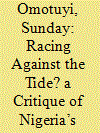|
|
|
Sort Order |
|
|
|
Items / Page
|
|
|
|
|
|
|
| Srl | Item |
| 1 |
ID:
180237


|
|
|
|
|
| Summary/Abstract |
The recent vigorous campaign by Nigerian government for a permanent membership of the United Nations Security Council is, like previous attempts, hinged on the country’s ‘track record’ in peacekeeping operations. However, in recent years, particularly since the uprising of the Boko Haram terrorist group, it appears that Nigeria’s commitment to this role has diminished considerably in its foreign policy priorities. This article, against this background, makes three arguments: First, it argues that Nigeria’s reluctance to keep faith with its peacekeeping mission is undermining the critical platform under which the quest for the seat is based. Second, notwithstanding the possession of the realist’s attributes of a regional leader, Nigeria’s poor image and dearth of soft power has created legitimacy crisis for it among regional states and beyond as none of its traditional allies in the Security Council has thrown its weight behind its bid. Finally, the study shows that the preponderance number of Nigerians does not subscribe to Nigeria’s bid in view of the security and socio-economic crises battling the country. Rather than dissipating energy on the quest, such effort should be channelled towards addressing the myriad domestic challenges threatening human security in the country.
|
|
|
|
|
|
|
|
|
|
|
|
|
|
|
|
| 2 |
ID:
196158


|
|
|
|
|
| Summary/Abstract |
Over the years, Nigeria’s regional hegemonic leadership in (West) Africa, especially within the Economic Community of West African States (ECOWAS) region, has been debated within academic and foreign relations circles. A major component of this regional leadership aspiration was its quest for a ‘borderless Africa’. As an important arrowhead of its pro-African foreign policy, the Nigerian government proactively crafted a benign national border policy to give practical expression to the free mobility of persons and goods within the West African subregion. Despite a demonstrable commitment to free mobility within Africa over the years, Abuja suddenly imposed a restrictive border policy shortly after it signed the African Continental Free Trade Area (AfCFTA) agreement and approved the contentious visa-on-arrival for African migrants. Considering this context, this study makes three arguments: First, it interrogates the rationale behind the liberal border diplomacy of the Nigerian government. Secondly, the paper contends that the inability to ‘silence the guns’ in Africa despite all efforts has seriously militated against the aspiration for intra-African mobility and borderless Community in West Africa. Lastly, the study examines the dire implications of Nigerian nationalistic border diplomacy and its declining soft power for the future of ‘borderless West Africa’.
|
|
|
|
|
|
|
|
|
|
|
|
|
|
|
|
|
|
|
|
|